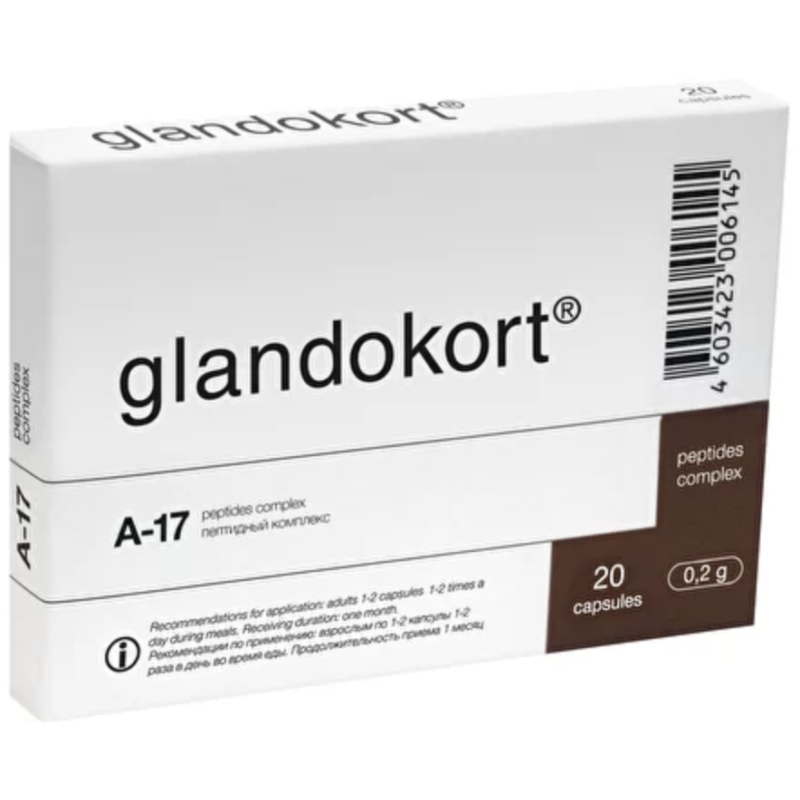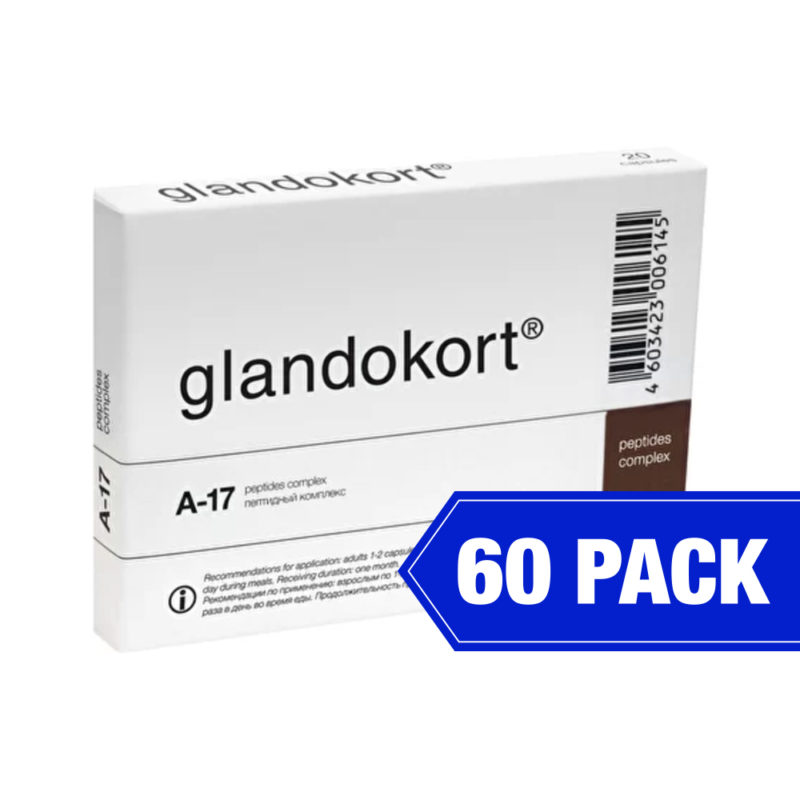REPORT on the results of clinical study of peptide bioregulator Glandokort
Biologically active food supplement Glandokort® contains a complex of low-molecular peptides with a molecular weight of up to 5000 Da, isolated from adrenal tissues of young animals – calves not older than 12 months of age or pigs.
Glandokort® is available in the form of capsules with the active substance content of 10 mg.
Experimental studies have shown that peptides have tissue-specific action on the cells of the tissues, which they were isolated from. Glandokort® regulates metabolic processes in the adrenal cortex cells, increases their reserve capacity by producing a beneficial effect on the adaptation processes in extreme conditions, and possesses antioxidant properties, regulating the processes of peroxidation in adrenal tissues. This allows us to assume the effectiveness of Glandokort® administration for the restoration of the endocrine system functions in case of their disorders of various origins, including prolonged exposure to stress factors and ageing.
Age-related or stress-induced decrease in the functional activity of the adrenal gland is one of the causes of dyshormonal and maladaptive disorders (3, 4).
Pharmacological therapy of these diseases and pathological conditions includes the use of the following drugs (1, 2):
- glucocorticoids – Prednisolone, Hydrocortisone;
- mineralocorticoids
- adaptogens (ginseng, extracts of Eleutherococcus, Leuzea, Rhodiola rosea, Aralia tinctures, Zamanihi, Saparal, Pantocrinum)
Clinical characteristics of patients
Clinical study of Glandokort® application efficiency was carried out at the Medical center of Saint Petersburg Institute of Bioregulation and Gerontology during the period from April till November 2011.
The study involved 36 patients aged 37 to 62 years, including 25 men and 11 women, with chronic adrenal cortex insufficiency and conditions after prolonged exposure to occupational and psycho-emotional stress. Patients of the main group received complex treatment with adaptogens (conventional treatment) with addition of Glandokort® by 1 capsule 2 times a day with meals for 30 days.
Control groups consisted of 26 patients with similar diseases, receiving conventional treatment with adaptogens. Patients receiving hormone therapy were excluded from the study.
Patients with chronic adrenal cortex insufficiency or exposed to occupational or psycho-emotional stress for a long time complained of general weakness, decreased appetite, headaches, sleep disturbances, increased irritability and apathy.
Research methods
Glandokort® treatment efficiency was assessed on the basis of dynamics of the patient complains and objective indicators. For this purpose a general clinical study of blood and urine and biochemical blood test were carried out. Radioimmunological methods were used to determine the content of hormones (cortisol, insulin) in the blood serum. The content of adrenaline and aldosterone in blood plasma, the level of excretion of 17-ketosteroids in urine were determined using various biochemical methods.
Research results
It was found that Glandokort® administration contributed to the improvement of the general condition of patients in the group under study. Patients reported an increase in physical and mental performance, improved mood and sleep.
Table 1
Influence of Glandokort® on the level of adrenal hormones in patients with chronic adrenal cortex insufficiency
|
Parameter |
Reference range |
Before treatment |
After conventional therapy |
After therapy with Glandokort® |
|
Aldosterone in blood plasma, (pg / ml) |
7,5-150 |
14,7±1,2 |
26,2±1,6 |
38,5±1,3*,** |
|
common 17-ketosteroids in urine, (μmol / day) |
17-70 |
19,8±1,6 |
38,2±2,4 |
46,3±2,1* |
* р<0,05 – significant in comparison with the parameter before treatment
** р<0,05 – significant in comparison with the parameter in the control group.
While taking Glandokort®, patients with chronic adrenal cortex insufficiency manifested restoration of the metabolic activity of the reticular adrenal zone, accompanied by an increase in the production of aldosterone and 17-ketosteroids, the content of which increased to the average values of the normal range (Tab. 1).
Table 2
Influence of Glandokort® on the level of cortisol and adrenocorticotropic hormone in blood plasma in persons exposed to prolonged occupational or psycho-emotional stress
|
Parameter |
Reference range |
Before treatment |
After conventional therapy |
After therapy with Glandokort® |
|
Cortisol (nmol / L) |
250-750 |
287,5±18,5 |
311,4±21,4 |
431,4±25,7*,** |
|
ACTH (pg / ml) |
10-80 |
14,2±1,1 |
17,4±1,3 |
28,6±1,1 |
* р<0,05 – significant in comparison with the parameter before treatment
Administration of Glandokort® in persons subjected to prolonged exposure to professional or psycho-emotional stress contributed to the stabilization of the hormonal status, which indicated the leveling of maladjustment disorders and catabolic reactions (Tab. 2). The content of cortisol and adrenocorticotropic hormone (ACTH) before the treatment bordered the lower limit of the normal range, which indicated the depletion of the adrenal cortex reserves. After complex treatment with Glandokort®, the level of cortisol and ATKG in blood plasma returned to normal. These changes correlated with improvements in subjective scores.
No side effects, complications and drug dependence were revealed in the process of Glandokort® administration.
Conclusion
- Biologically active food supplement Glandokort® normalizes functional activity of the adrenal gland cells.
- Glandokort® is well tolerated at oral administration, does not have any side effects and can be used as a therapeutic and prophylactic biologically active food supplement.
- Glandokort® is recommended for patients with adrenal cortex dysfunction and after prolonged exposure to occupational or psycho-emotional stress per os at mealtime 1-2 capsules 2 times a day for 30 days.
- If necessary a repeated course of treatment can be carried out in 3-6 month.
References
- Belousov Y.B., Moiseev V.S., Lepakhin V.K. Clinical pharmacology and pharmacotherapy: Manual for doctors. – М.: Universum, 1993. – 398 pages.
- Mashkovsky M.D. Medicines: Pharmacotherapy manual for healthcare professionals: 2 parts – Vilnus: ZAO “Gamta”, 1993.
- Geriatrics manual / Edited by D.F. Chebotarev, N.B. Mankovsky. – М.: Medicine, 1982. – 544 pages.
- Tepperman J., Tepperman H. Metabolic and endocrine physiology an introductory text: Translated from English. – М.: Mir, 1989. – 656 pages.
Recommendations for use
Glandokort® is a complex of peptides obtained from the adrenal glands of young animals. The isolated peptides have a selective effect on adrenal cells, normalize their metabolism and regulate the functions of the endocrine system.
Clinical study revealed the effectiveness of Glandokort® in the complex treatment of patients with adrenal cortex dysfunction and prolonged exposure to professional or psycho-emotional stress. Glandokort® restored the functions of the endocrine system after diseases of various origins, after exposure to extreme environmental factors, malnutrition and ageing.
Glandokort® should be taken per os at mealtime 1-2 capsules 1-2 times a day. The period of administration makes 30 days. It is advisable to have a repeated course in 4-6 month.
Contraindications: individual intolerance to the components, pregnancy, breast feeding.
Administration of Glandokort® has not resulted in any side effects.
It is recommended to store in a dry dark place at the temperature from +2 up to +25ºС.
Pharmaceutical form: 20 capsules or tablets of Glandokort® 10 mg each.
Period of validity – 3 years from the day of manufacturing.
Executive officer:
|
Deputy Director of LLC “Medical Center of Saint Petersburg Institute of Bioregulation and Gerontology of the Northwest Branch of the Russian Academy of Medical Sciences” in charge of clinical affairs, Ph.D., assistant professor |
______________________A.A. Veretenko |
|
Action officer: Chief Physician of LLC “Medical Center of Saint Petersburg Institute of Bioregulation and Gerontology of the Northwest Branch of the Russian Academy of Medical Sciences”, Ph.D. |
_____________________O.Y. Raygorodsky |


